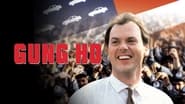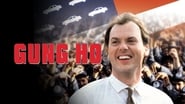Stometer
Save your money for something good and enjoyable
UnowPriceless
hyped garbage
Moustroll
Good movie but grossly overrated
Guillelmina
The film's masterful storytelling did its job. The message was clear. No need to overdo.
SnoopyStyle
The auto plant in Hadleyville, Pennsylvania had closed down after 35 years. The town is desperate. Foreman Hunt Stevenson (Michael Keaton) travels to Japan to convince Assan Motors to reopen the plant. He's successful to his complete surprise. He's hired by new plant manager Takahara Kazuhiro (Gedde Watanabe) as liaison with the American workers. Takahara had been shamed for being a bad executive. Hunt struggles between the demands from Japanese management and the expectations of the American workers.Director Ron Howard makes light-hearted fun from a difficult subject matter. For the most part, it works for me. It can be off-putting for an audience that is either pro or anti-union. Howard essentially splits the difference by having both workers and management come together in a happy ending. Michael Keaton is fun. He faces the challenge with charm. Another director would make this a tougher movie but Howard is not that guy.
tieman64
"Thus did a handful of rapacious citizens come to control all that was worth controlling. Honest, industrious citizens were classed as bloodsuckers if they asked to be paid a living wage, and praise was reserved henceforth for those who devised means of getting paid enormously for committing crimes against which no laws had been passed." - Kurt Vonnegut Ron Howard's "Gung Ho" stars Michael Keaton as Hunt Stevenson, a factory worker at an auto plant in Hadleyville, Pennsylvania. When the plant is purchased by Assan Motors, a Japanese company, Hunt becomes a liaison between Japanese bosses and American workers.For most of its running time, "Gung Ho" is a slick, well-shot and funny feature. Here, Japanese capitalism is shown to be dangerously obsessed with production, exploitation and servitude. In contrast, American workers and bosses are shown to be slovenly, lackadaisical and overly individualistic, traits which hamper corporate profits.By the film's end, however, Howard reveals "Gung Ho's" quite sinister message: the worker of tomorrow is better off if he adopts a mixture of Eastern and Western values. Work hard, increase production and put your job first, and mega-corporations won't fire you, abandon you and go seeking cheaper labour elsewhere. But don't work too hard; after-all, an alive worker is a good worker.That this is not only a form of social blackmail, and a false binary – the worker forced to choose between two types of the same exploitation – doesn't occur to Howard. That capitalism's many contradictions means that it must, in aggregate, lead to bankruptcy, debt, unemployment, downsizing, lowered wages and unemployment regardless of "efficiency" or "the behaviour of the worker", doesn't occur to him either. Co-starring Mimi Rogers, the film quite cleverly positions its audience to sympathise with what would otherwise be deemed racial stereotypes.7.5/10 - Worth one viewing.
Rodrigo Amaro
With no laughs but with important messages, "Gung Ho" manages to be a reflexive entertainment about the cultural and economical clashes of two nations when they join forces to rise from the ashes an automobile factory that can be the only hope of saving a town. Michael Keaton plays an American executive who gets the job of rescuing such factory with a new leadership coming from Japan with a desperate executive (Gedde Watanabe) trying to save his career from potential failure. The latter's task is to command the American plant and their workers, accustomed to work in a particular way, trying impose the Oriental methods of working for long hours for the benefit of the company and such clashes with the interests of Keaton who's trying to look good before his friends who aren't used to such working journey. But let's face it: the movie isn't funny. Babaloo Mandel and Lowell Ganz are terrific writers ("Splash", "Parenthood") but they didn't create much moments we could say they were funny, most of the time is just using of caricatures to make some amusing moments, they barely work, maybe two or three scenes. Their concentration to the more engaging aspects was what made "Gung Ho" something really worth seeing. It pokes fun on the culture comparisons between U.S., specially when it comes to both nations traditions but it also establishes a greater sense of supporting each other, one might be better than the other but only together they come up with something bigger, better and stronger. Having a movie like this made on a decade where American superiority was presented in every single movie and also in politics is something of a miracle. It basically says: "We're no longer the strongest nation in the world, neither the most efficient but we can aspire to be if we follow some other examples around the world". Sure, it doesn't paint a fair picture for both sides (Japanese as workaholics who can't contest their bosses and Americans as lazy and incompetent), often recurring to stereotypes but presents something good out of those. Although a little sloppy, clichéd and never serious enough, "Gung Ho" can be used as a source of inspiration, at least for those who have a company and doesn't know how to bring out the best with their employs, it's always there to bring out of the best of a team, push them to the limits and show them the advantages of following new directives. I know this movie is something of a classic between Administration students in here, and most of them enjoy it. Out of this department, it might be a disappointment for Keaton and Ron Howard fans, they're not at their best. The supporting cast formed with the likes of Mimi Rogers, George Wendt, John Turturro, Rance and Clint Howard save this for a bit, but the most interesting in scene is Watanabe, the funniest in the show. In the end, it reaches its purpose of presenting a parallel between cultures, but never takes our fully enjoyment, neither much of our laughs. Easy to watch and quite motivational though. 7/10
gtbarker
This is quite simply the worst film I have ever seen. It's nothing more than an anti-worker propaganda exercise to make everyone think that workers everywhere deserve everything they get. I am sure such a crass message works on the right wing, but to sane people I would hope they see it for the load of 'bosses good-workers bad' garbage that it is. It's almost as though the bosses of the biggest American industries got together and said 'look we all know how successful the Japanese economy and a lot of that is down to a highly disciplined robotically obedient workforce - how could we make American workers perform similarly?' And they came up with this utter rubbish.At the time I was visiting the cinema at least once a week and saw some very good and alternatively some dreadful films, but this one was in a league of it's own and was singley responsible for me deciding to reduce my cinema visits from then on.




